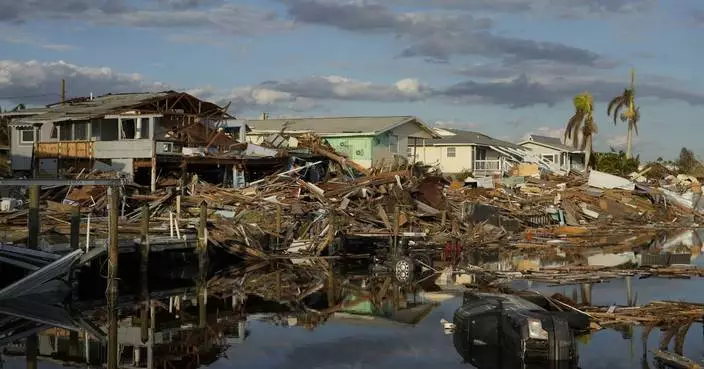NEW YORK (AP) — Some judges in a New York appeals court appeared receptive Thursday to possibly reversing or reducing a civil fraud judgment that stands to cost Donald Trump nearly $500 million. One judge called the former president’s penalty “troubling” and wondered if the state’s policing of private business transactions was “deterrence” or “mission creep.”
A five-judge panel in the state’s intermediate appeals court in Manhattan quizzed lawyers representing Trump and the New York attorney general's office during oral arguments in the Republican presidential nominee's fight to get the Feb. 16 verdict overturned.
At times the judges appeared dubious of Trump’s side, too. Appeals court judges often ask pointed questions of both sides to test their arguments.
Trump is asking the court to reverse Judge Arthur Engoron’s ruling that Trump lied for years about his wealth on paperwork given to banks, insurers and others to make deals and secure loans. The verdict cut to the core of Trump’s wealthy, businessman persona. Three of the five judges who heard Thursday’s arguments must agree in order to alter the outcome.
Trump did not attend the hearing, which was held in an unusually ornate appellate courtroom — a far cry from the sterile courthouse where he spent weeks as a criminal defendant in his hush-money felony case earlier this year.
In the past, Trump has decried the lawsuit's outcome as “election interference” and accused Engoron of punishing him for “having built a perfect company.”
The appeals court, known as the Appellate Division, typically rules about a month after arguments, meaning a decision could come before Election Day, Nov. 5. It could uphold the trial verdict, reduce or overturn it.
Trump lawyer D. John Sauer argued that the lawsuit brought by Attorney General Letitia James, a Democrat, stretched the state's consumer protection laws, insinuating the government into transactions where there were “no victims" and “no complaints.”
Trump did business with “sophisticated counterparties" that performed their own due diligence rather than relying solely on Trump's financial statements — documents that Engoron ruled wildly inflated his net worth.
The case, Sauer said, “involves a clear cut violation of the statute of limitations." Judge Llinét Rosado noted that the case involved some “loans which closed long ago.”
If the verdict is allowed to stand, he argued, "people can’t do business in real estate" without fearing they'll face similar scrutiny, Sauer said.
The state's deputy solicitor general, Judith Vale, countered that “there was absolutely a public impact and a public interest here,” noting that lenders including Deutsche Bank incurred undue risk based on Trump's representations.
But Judge Peter H. Moulton questioned if James' office was engaging in “mission creep,” and whether the law she sued Trump under had "morphed into something that it was not meant to do.” At the same time, Moulton suggested the lawsuit and actions like it may deter similar actions going forward, reasoning that “in the future, some deal might not go down well and someone would be harmed by that.”
Judge David Friedman drew a distinction between Trump's case and others that were brought under the law in which corporate actions harmed large groups of people. One stemmed from the 2008 collapse of investment firm Lehman Brothers and another involved consumers taking out home loans they could not afford.
“It hardly seems that justifies bringing an action” against Trump, Friedman said. “You don't have anything like that here.”
Judge John Higgitt asked if the appeals court should consider “guardrails” to prevent James from “going into an area that wasn’t intended for her jurisdiction.”
Later, Moulton questioned Vale about Engoron's hefty punishment, observing that “the immense penalty in this case is troubling.”
Vale explained that, under the law, the judge was permitted to essentially take away whatever Trump gained from transactions based on his inflated financial statements. The gains included profits from selling properties like his Washington, D.C. hotel and savings from lower loan interest rates.
“That is an enormous benefit that they got from the misconduct, and it is not an excuse to say, ‘well, our fraud was really successful, so we should get some of the money,’” Vale argued.
The state argues there is ample evidence backing the verdict and that Trump’s appeal is based in part on arguments that Engoron and the Appellate Division have rejected before.
Sauer, a former Missouri solicitor general, previously argued Trump’s successful presidential immunity case before the U.S. Supreme Court.
Ruling after a 2½-month trial, Engoron found that Trump had padded his net worth by several billion dollars on annual financial statements by overvaluing assets including his golf courses and hotels, his Mar-a-Lago estate in Florida and his Trump Tower penthouse in Manhattan.
Trump and his co-defendants are also challenging Engoron’s decision to rule, even before testimony had begun, that the state had proven that Trump had fraudulently inflated his financial statements. The judge ordered Trump and the other defendants to pay $363.9 million in penalties — a sum that has now grown with interest to more than $489 million.
Trump posted a $175 million bond in April to halt collection of the judgment and prevent the state from seizing his assets while he appeals. The bond guarantees payment if the judgment is upheld. If Trump wins he’ll get the money back.
If either side doesn’t like the outcome, it can ask the state’s highest court, the Court of Appeals, to consider taking the case. Trump has vowed to fight the verdict “all the way up to the U.S. Supreme Court if necessary.”

Republican presidential nominee former President Donald Trump speaks during a campaign event, Wednesday, Sept. 25, 2024, in Mint Hill, N.C. (AP Photo/Evan Vucci)
NEW YORK (AP) — Israel’s military says it has intercepted a missile fired from Yemen that set off air raid sirens across the country’s center.
Air raid sirens rang out across Israel’s populous central area, including the seaside metropolis of Tel Aviv.
Another missile from Yemen landed in central Israel about two weeks ago.
THIS IS A BREAKING NEWS UPDATE. AP’s earlier story follows below.
NEW YORK (AP) — Israeli Prime Minister Benjamin Netanyahu on Thursday vowed to carry out “full force” strikes against Hezbollah until it ceases firing rockets across the border, dimming hopes for a cease-fire proposal put forth by U.S. and European officials.
Israel carried out a new strike in the Lebanese capital, which killed a senior Hezbollah commander, and the militant group launched dozens of rockets into Israel. Tens of thousands of Israeli and Lebanese people living near their countries' border have been displaced by the fighting.
Netanyahu spoke as he landed in New York to attend the annual U.N. General Assembly meeting, where U.S. and European officials were putting heavy pressure on both sides of the conflict to accept a proposed 21-day halt in the fighting to give time for diplomacy and avert all-out war.
Nearly 700 people have been killed in Lebanon this week as Israel dramatically escalated strikes, saying it is targeting Hezbollah’s military capacities. Israeli leaders say they are determined to stop the group's cross-border attacks, which began after Hamas' Oct. 7 attack that ignited the war in Gaza.
Israel’s “policy is clear," Netanyahu said. "We are continuing to strike Hezbollah with full force. And we will not stop until we reach all our goals, chief among them the return of the residents of the north securely to their homes.”
Just before his comments, the Israeli military said it killed a Hezbollah drone commander, Mohammed Hussein Surour, in an airstrike in the suburbs of Beirut. Hezbollah later confirmed Surour's death.
The Health Ministry said two people were killed and 15 wounded in the strike. Associated Press photos of the scene showed a gutted apartment in a residential building in Dahiyeh, the mainly Shiite suburb where Hezbollah has a strong presence.
Until recently, Israel had rarely targeted sites in Beirut during the low-level conflict with Hezbollah that has been ongoing since October. However, in the past week, Israel has struck Beirut’s southern suburbs several times.
Over the past week, Israel has carried out several strikes in Beirut targeting senior Hezbollah commanders. One strike in eastern Lebanon on Thursday killed 20 people, most of them Syrian migrants, according to Lebanese health officials.
Israel hit 75 sites early Thursday across southern and eastern Lebanon and launched a new wave of strikes in the evening, the military said. Throughout the day, Hezbollah fired some 175 projectiles into Israel, the Israeli military said. Most were intercepted or fell in open areas, sparking some wildfires, though one rocket hit a street in a town near the northern city of Safed.
Israel has talked of a possible ground invasion into Lebanon to drive Hezbollah -- an Iranian-backed Shiite group that is the strongest armed force in Lebanon -- away from the border. It has moved thousands of troops to the north in preparation. Some 100,000 Lebanese have fled their homes in the past week, streaming into Beirut and points further north.
Israeli military vehicles transported tanks and armored vehicles toward the country’s northern border with Lebanon a day after commanders issued a call-up of reservists. Several tanks arrived in Kiryat Shmona, a hard-hit town just several miles from the border.
The escalation has raised fears of a repeat – or worse – of the 2006 war between the two sides that wreaked destruction across southern Lebanon and other parts of the country and saw heavy Hezbollah rocket fire on Israeli cities.
“Another full-scale war could be devastating for both Israel and Lebanon,” U.S. Defense Secretary Lloyd Austin said after talks with his British and Australian counterparts in London.
U.S. Secretary of State Antony Blinken was at the U.N. meeting with Israeli officials over the truce proposal. Speaking in an interview with MSNBC, he said major powers, the Europeans and Arab nations were united, “everyone speaking with one clear voice about the need to get that cease-fire in the north.”
“I can’t speak for him,” Blinken said of Netanyahu.
Hezbollah has not yet responded to the proposal. Lebanon’s caretaker Prime Minister Najib Mikati welcomed it, but his government has no sway over the group.
Netanyahu’s office downplayed the initiative, saying in a statement that it was only a proposal.
One of Netanyahu’s far-right governing partners threatened on Thursday to suspend cooperation with his government if it signs onto a temporary cease-fire with Hezbollah – and to quit completely if a permanent deal is reached. It was the latest sign of displeasure from Netanyahu’s allies toward international cease-fire efforts.
“If a temporary cease-fire becomes permanent, we will resign from the government,” said National Security Minister Itamar Ben-Gvir, head of the Jewish Power party.
If Ben-Gvir leaves the coalition, Netanyahu would lose his parliamentary majority and could see his government come toppling down, though opposition leaders have said they would offer support for a cease-fire deal.
Hezbollah has insisted it would halt its strikes only if there is a cease-fire in Gaza, where Israel has battled Hamas for nearly a year. That appears out of reach despite months of negotiations led by the United States, Egypt and Qatar.
One day after Hamas’ Oct 7 attack on southern Israel that triggered the war in Gaza, Hezbollah began firing rockets into northern Israel, bringing Israeli counterfire and a cycle of reprisals that has gone on near daily since. Hezbollah says its barrages are a show of support for Palestinians and that it is targeting Israeli military facilities, though rockets have also hit civilian areas.
Before this week, the cross-border exchanges had killed about 600 people in Lebanon, mostly militants but including more than 100 civilians, and about four dozen people in Israel, roughly half of them soldiers and the rest civilians. The fighting also forced tens of thousands to flee homes on both sides of the border.
Israel says its escalated strikes across Lebanon the past week are targeting Hezbollah rocket launchers and other military infrastructure. Since Monday, strikes have killed more than 690 people in Lebanon, around a quarter of them women and children, according to local health authorities.
The campaign opened with what is widely believed to be an Israeli attack on Sept. 18 and 19 detonating thousands of pagers and walkie-talkies used by Hezbollah, killing at least 39 people and maiming thousands more, including civilians.
Hezbollah in turn has fired hundreds of rockets into Israel. Several people in Israel have been wounded. On Wednesday, the group fired on Tel Aviv for the first time with a longer-range missile that was intercepted.
Early Thursday, an Israeli airstrike hit a building housing Syrian workers and their families near the ancient city of Baalbek in Lebanon’s eastern Bekaa Valley. The Lebanese Health Ministry said 19 Syrians and a Lebanese were killed, one of the deadliest single strikes in Israel’s intensified air campaign.
Hussein Salloum, a local official in Younine, said most of the dead were women and children. The state news agency had initially reported that 23 people were dead.
Lebanon, with a population of around 6 million, hosts nearly 780,000 registered Syrian refugees and hundreds of thousands who are unregistered — the world’s highest refugee population per capita.
Mroue reported from Beirut, Lidman from Tel Aviv. Associated Press journalist Sam McNeil contributed to this report from Kiryat Shmona, Israel.
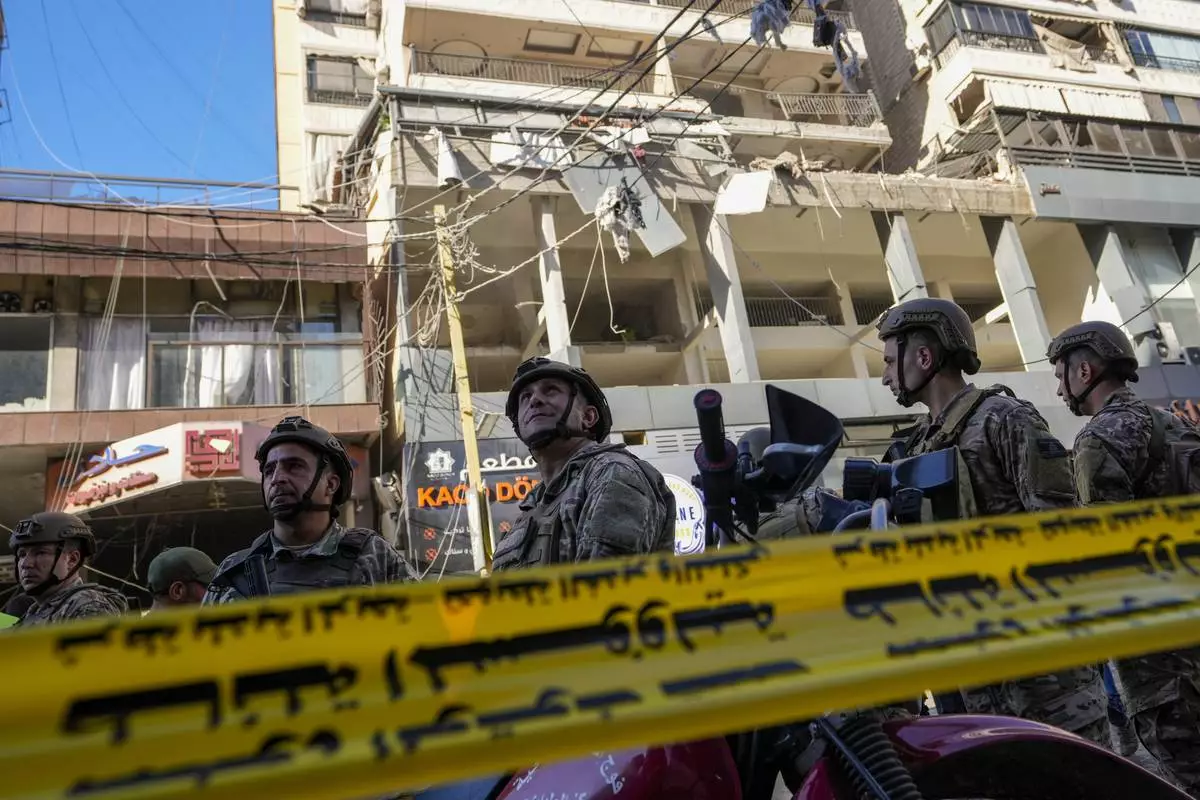
Lebanese soldiers cordon off the area at the site of an Israeli airstrike in Beirut's southern suburbs, Thursday, Sept. 26, 2024. (AP Photo/Hassan Ammar)
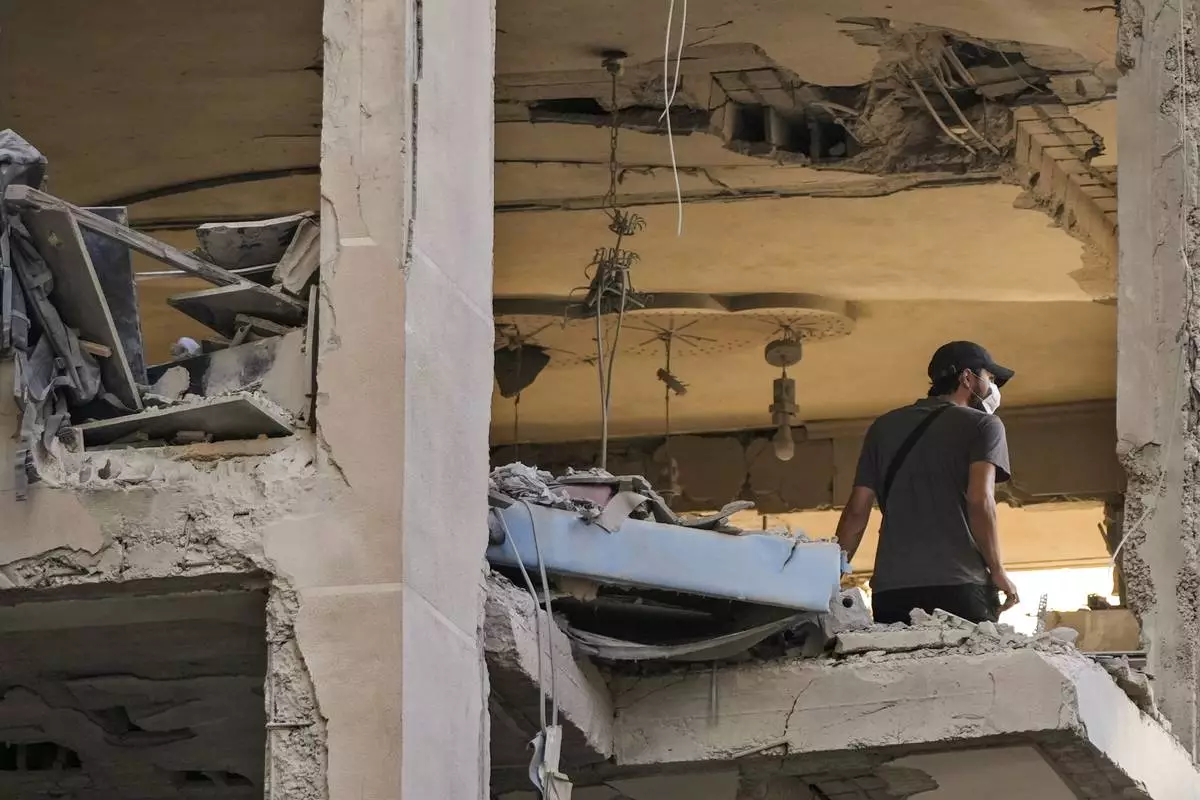
A resident checks an apartment that was hit by an Israeli airstrike in Beirut's southern suburbs, Thursday, Sept. 26, 2024. (AP Photo/Hassan Ammar)
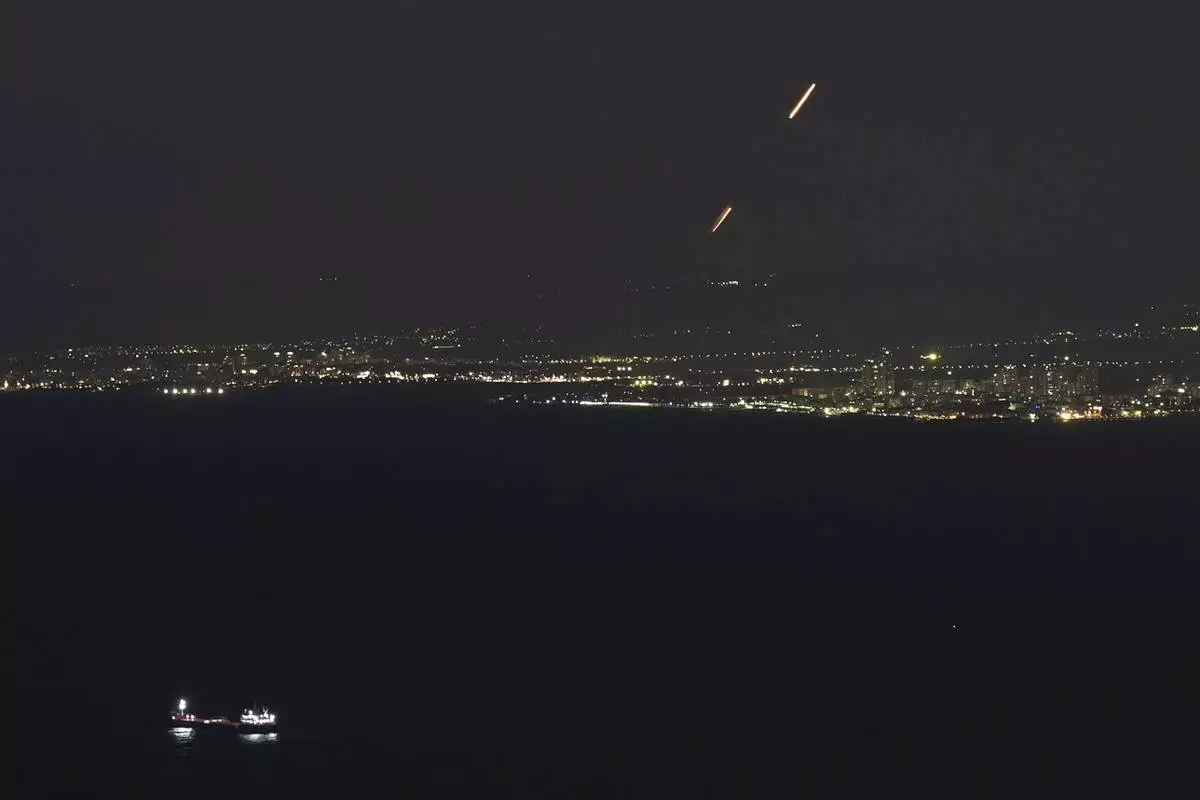
Israeli Iron Dome air defense system fires to intercept rockets that were launched from Lebanon, as seen from Haifa, northern Israel, Thursday, Sept. 26, 2024. (AP Photo/Baz Ratner)
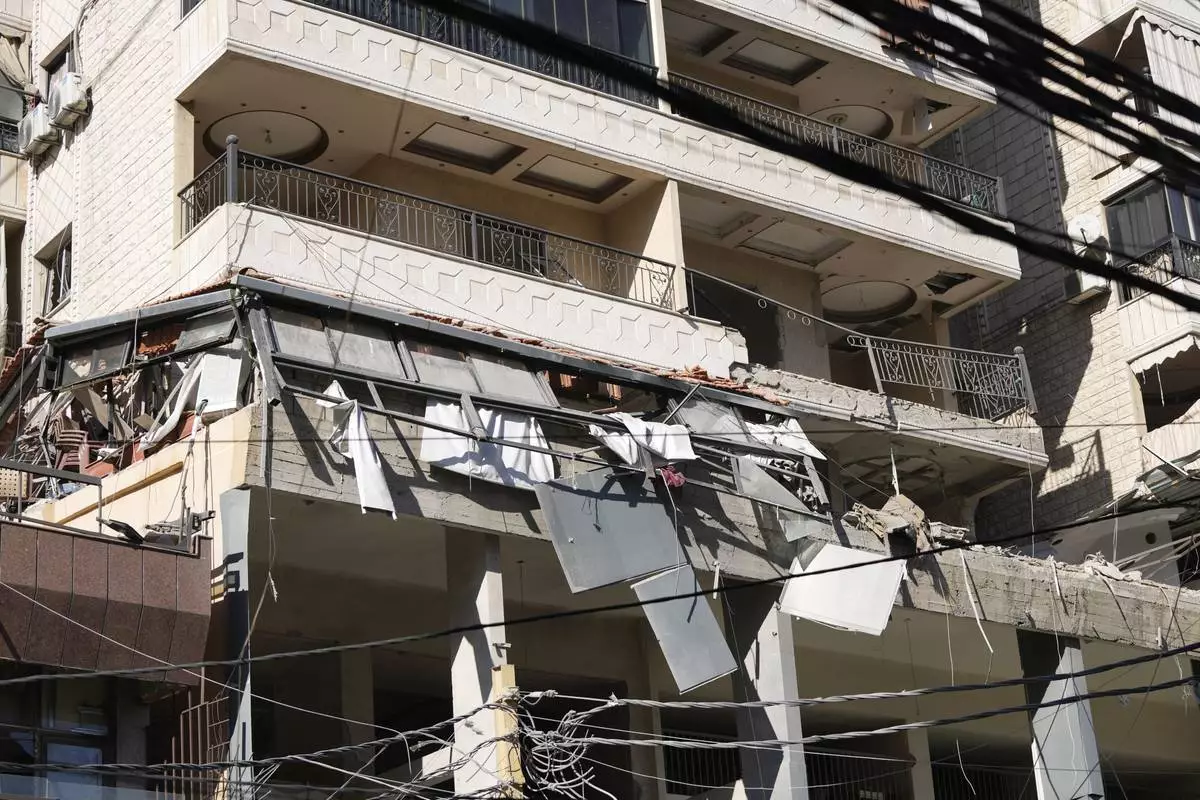
A damaged building at the site of an Israeli airstrike in Beirut's southern suburbs, Thursday, Sept. 26, 2024. (AP Photo/Hassan Ammar)
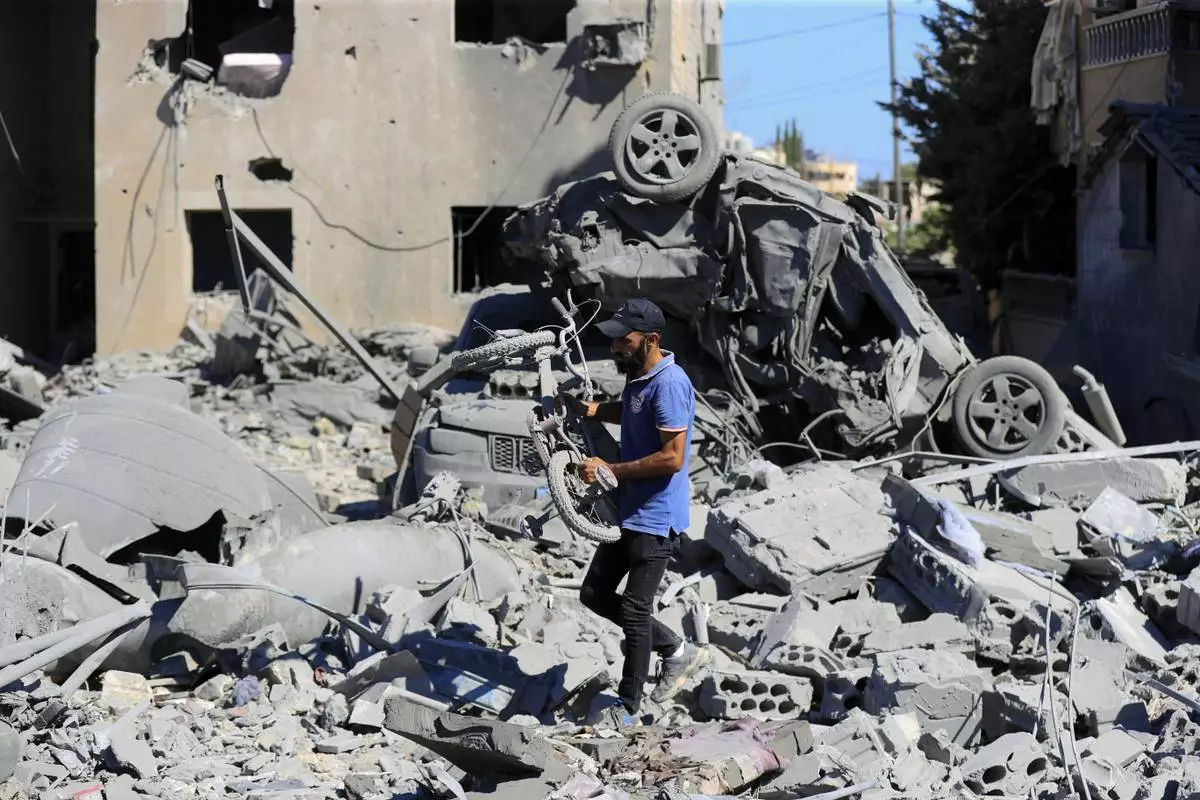
A man carries a damaged bicycle at the site of an Israeli airstrike in Saksakieh, south Lebanon, Thursday, Sept. 26, 2024. (AP Photo/Mohammed Zaatari)
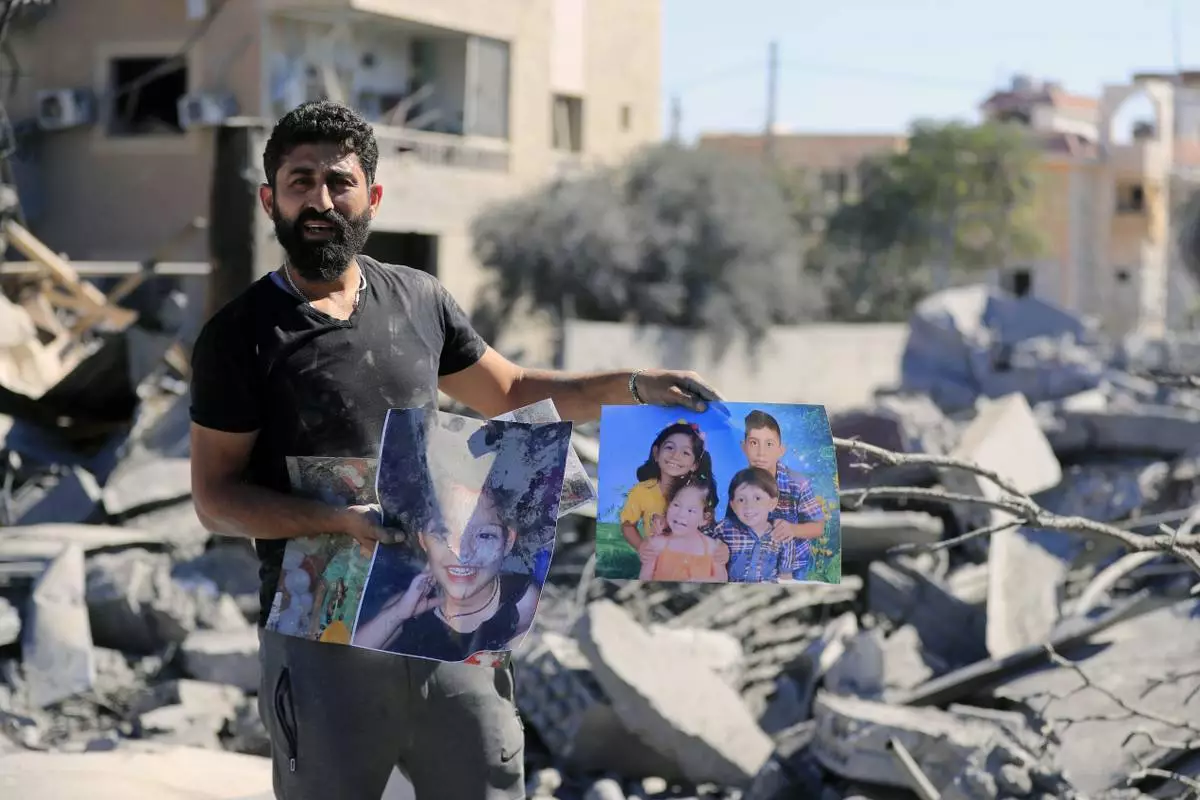
A man carries pictures of his relatives standing at the site of an Israeli airstrike in Saksakieh, south Lebanon, Thursday, Sept. 26, 2024. (AP Photo/Mohammed Zaatari)
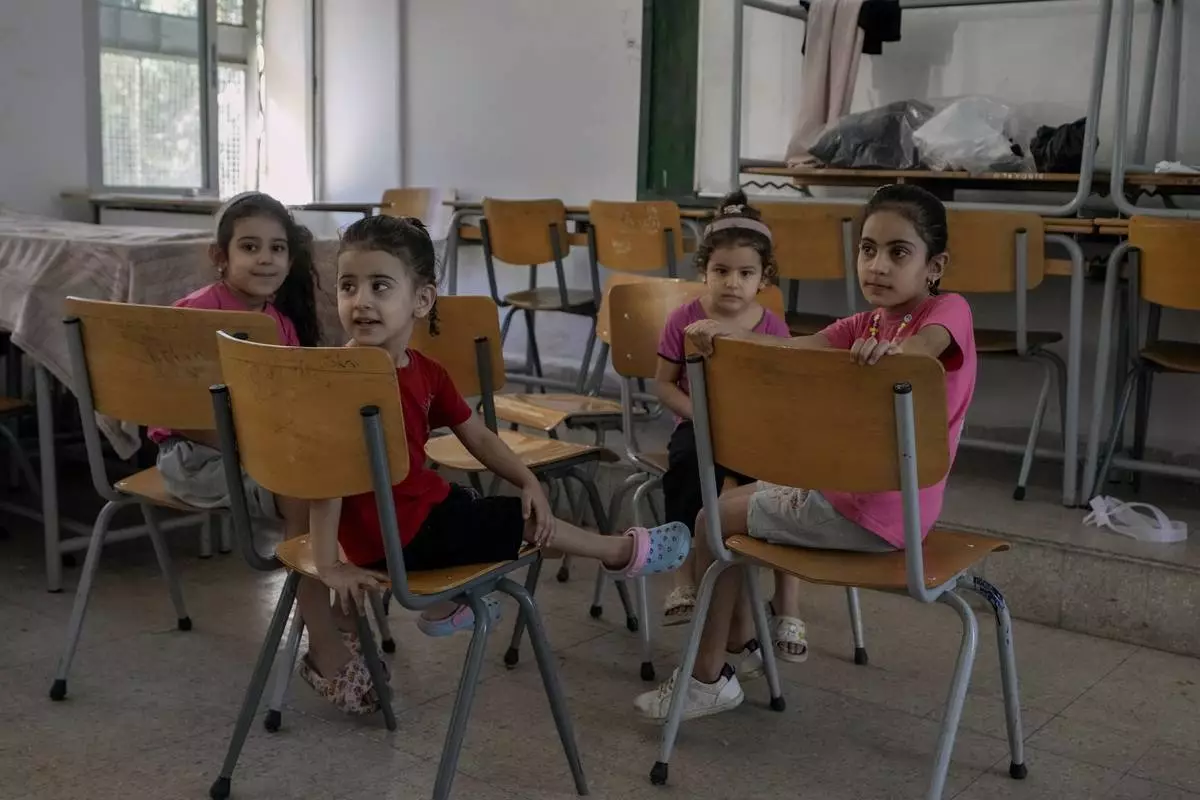
Displaced children sit in a classroom in Beirut, after fleeing the Israeli airstrikes in the south with their families, Thursday, Sept. 26, 2024. (AP Photo/Bilal Hussein)
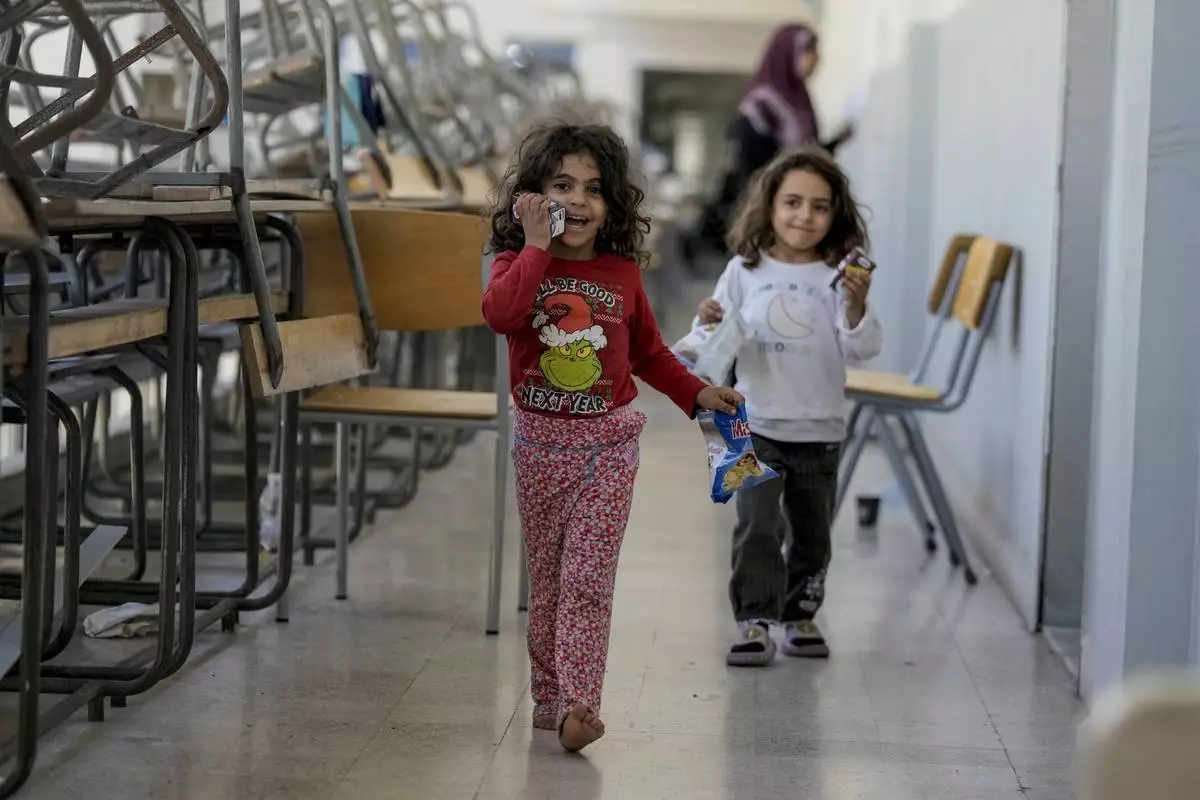
Displaced children play in a classroom at a school, in Beirut, after fleeing the Israeli airstrikes in the south with their families, Thursday, Sept. 26, 2024. (AP Photo/Bilal Hussein)
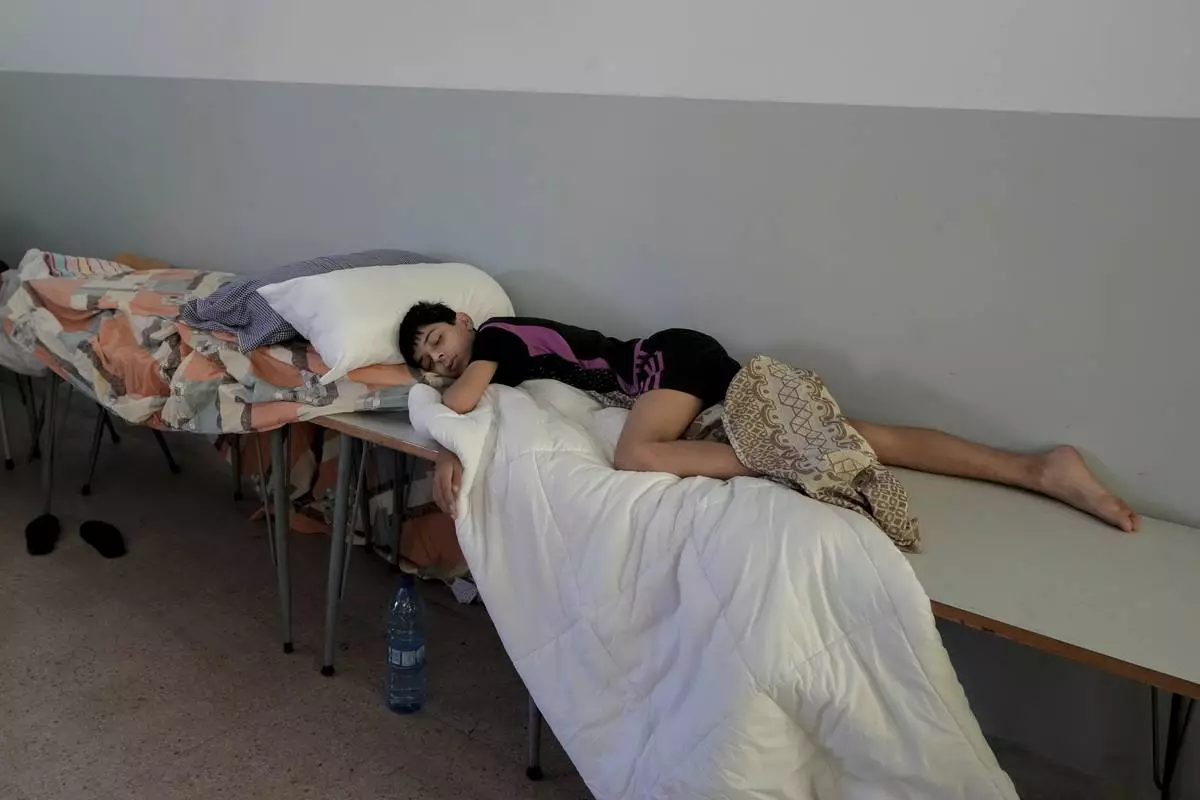
A displaced boy sleeps in a classroom in Beirut, after fleeing the Israeli airstrikes in the south with his family, Thursday, Sept. 26, 2024. (AP Photo/Bilal Hussein)
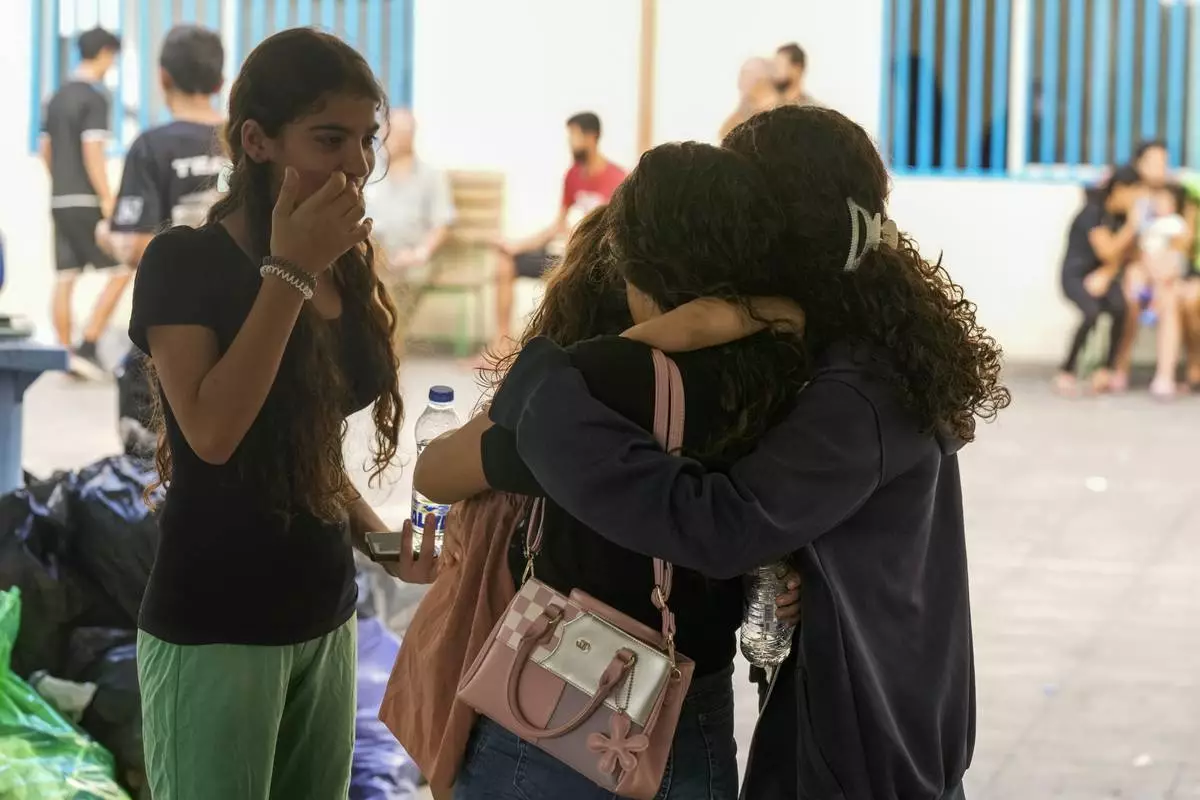
Displaced youth hug as they take shelter at a school in Beirut, after fleeing the Israeli airstrikes in the south with their families, Thursday, Sept. 26, 2024. (AP Photo/Bilal Hussein)
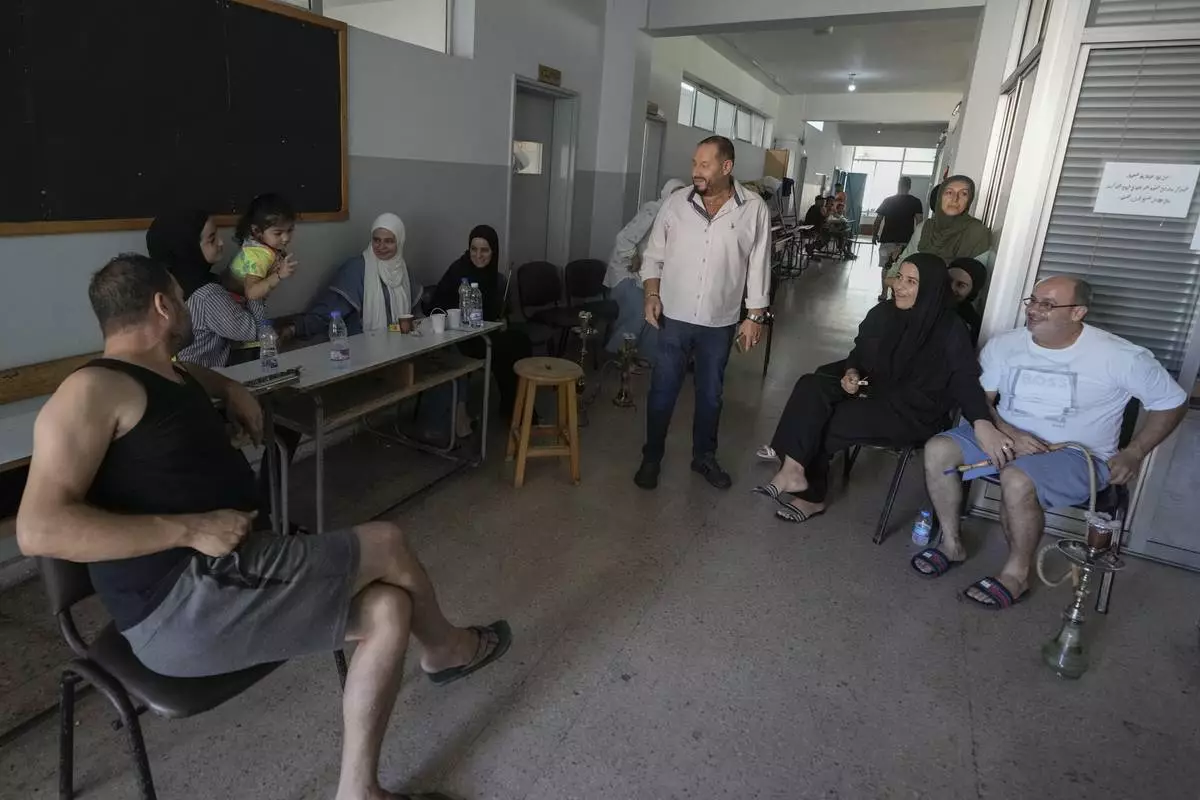
Displaced people gather in the hallway of a school in Beirut, after fleeing the Israeli airstrikes in the south, Thursday, Sept. 26, 2024. (AP Photo/Bilal Hussein)
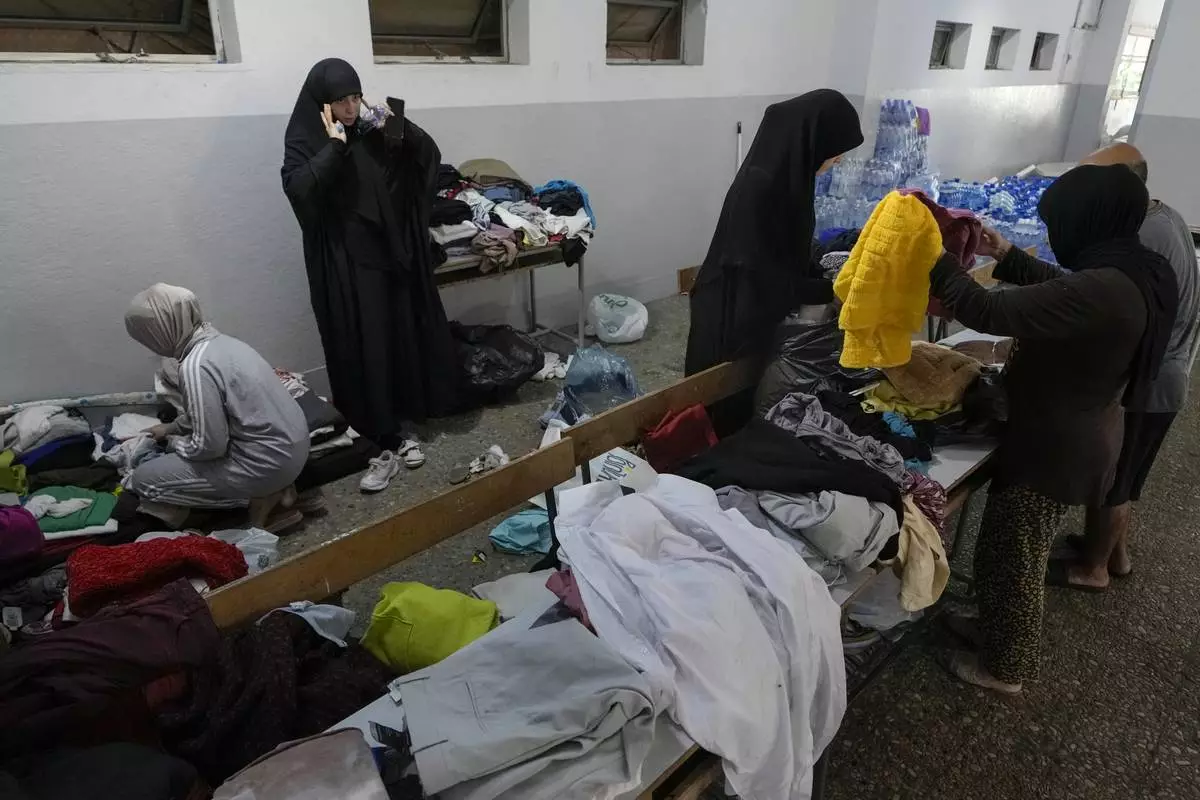
Volunteers distribute clothes to displayed women at a school in Beirut, Thursday, Sept. 26, 2024. (AP Photo/Bilal Hussein)
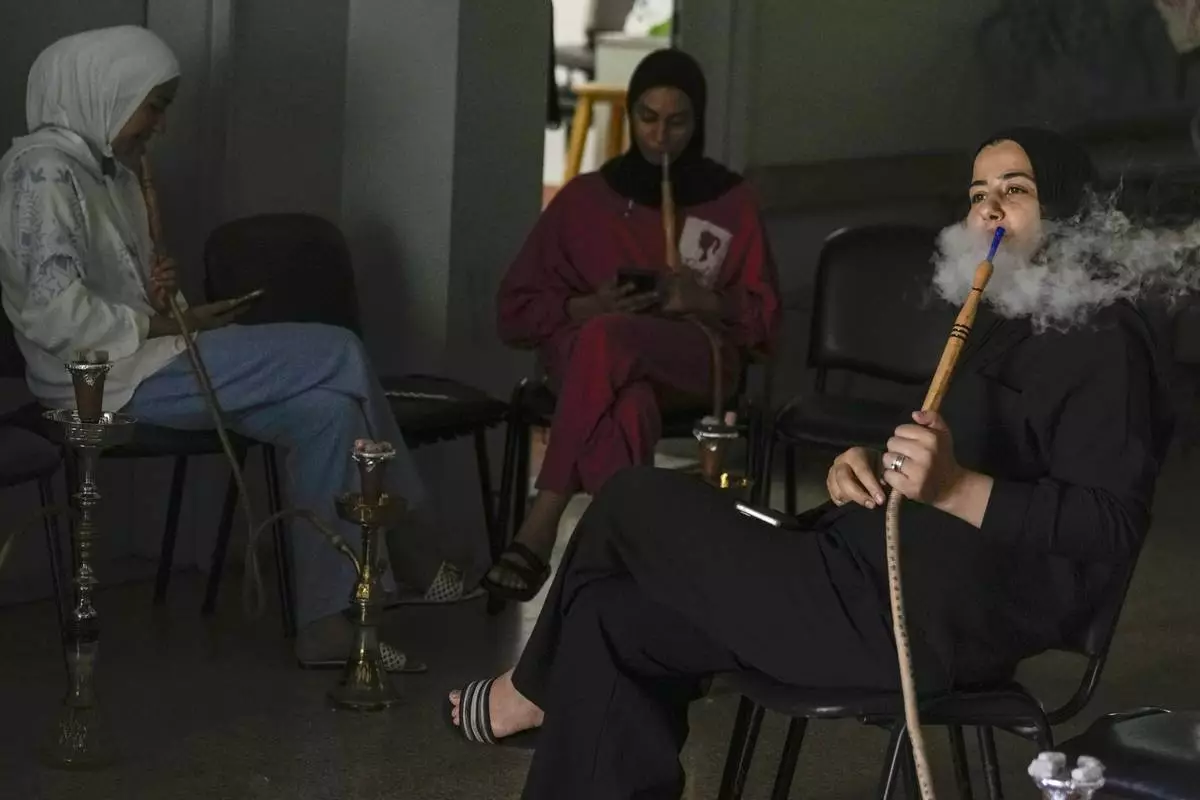
Displaced women smoke waterpipes as they sit in a school in Beirut, Thursday, Sept. 26, 2024. (AP Photo/Bilal Hussein)
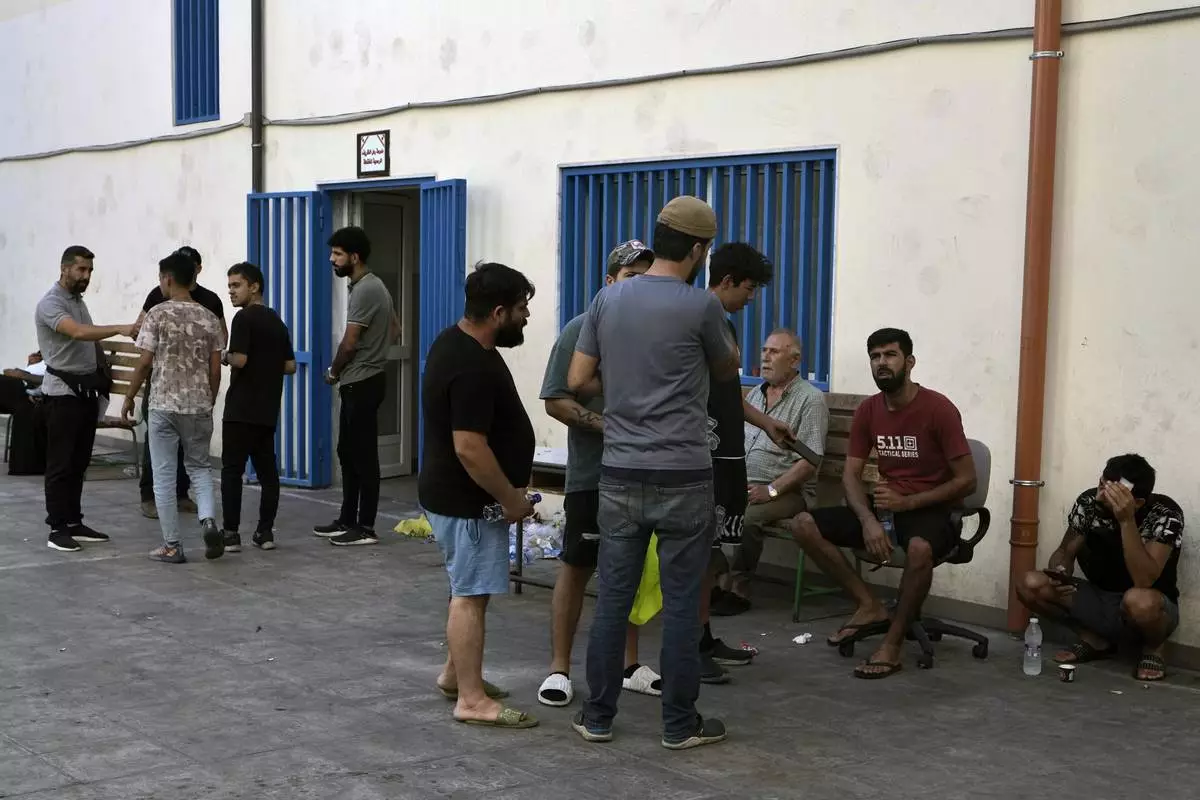
Displaced people sit in a school yard in Beirut, after fleeing the Israeli airstrikes in the south, Thursday, Sept. 26, 2024. (AP Photo/Bilal Hussein)
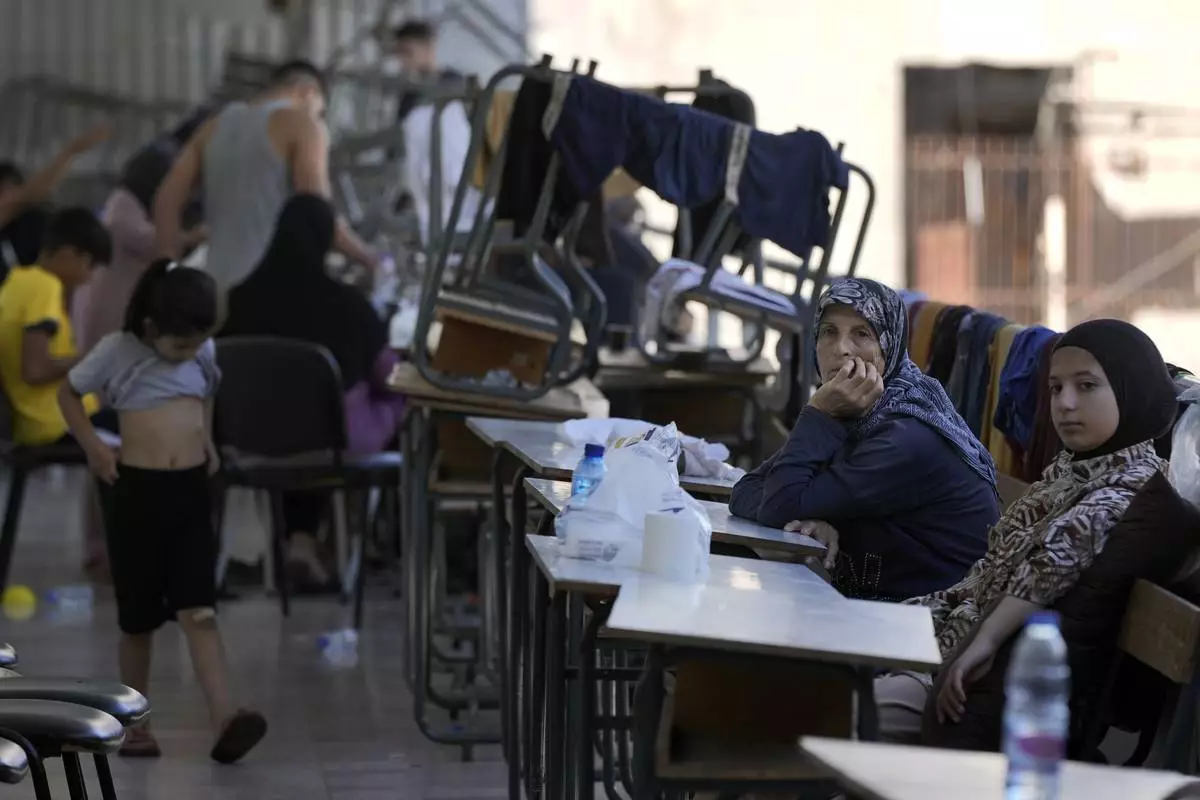
Displaced women and children sit in a classroom in Beirut, after fleeing the Israeli airstrikes in the south, Thursday, Sept. 26, 2024. (AP Photo/Bilal Hussein)
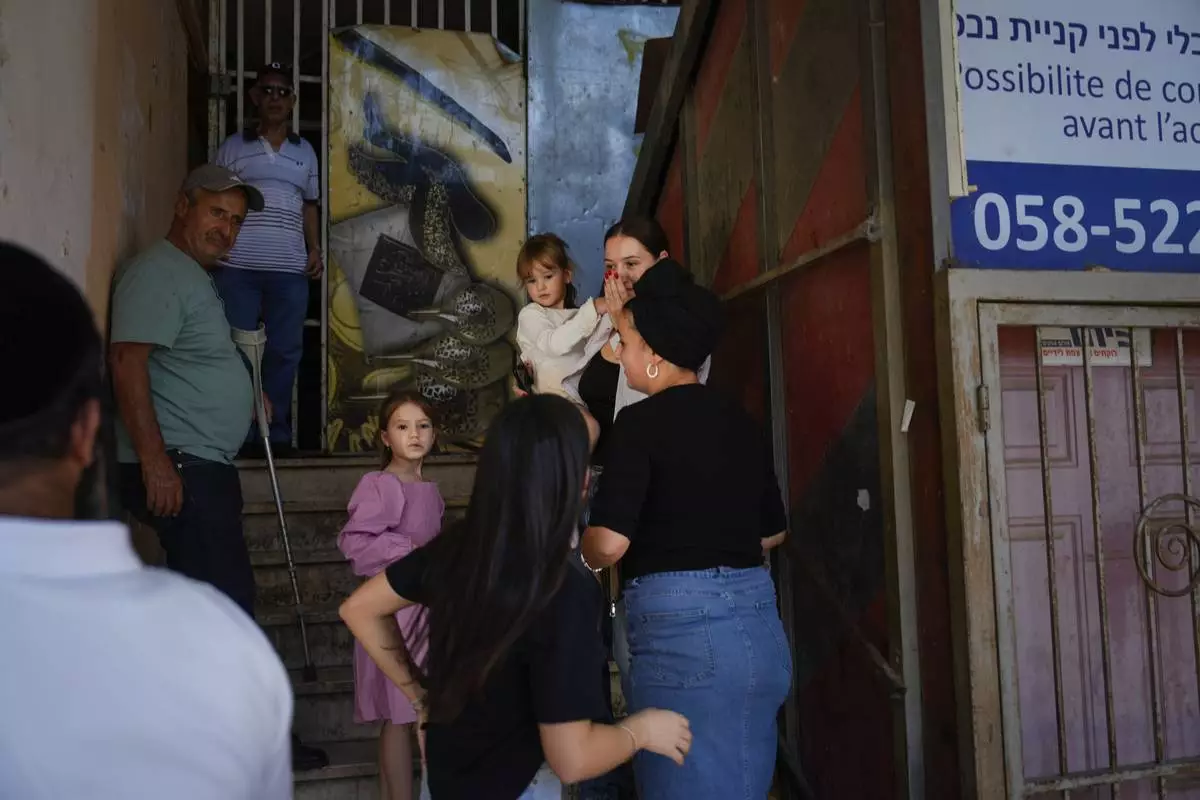
People take cover as a siren sounds a warning of incoming rockets fired from Lebanon, in Safed, northern Israel, Thursday, Sept. 26, 2024. (AP Photo/Ariel Schalit)
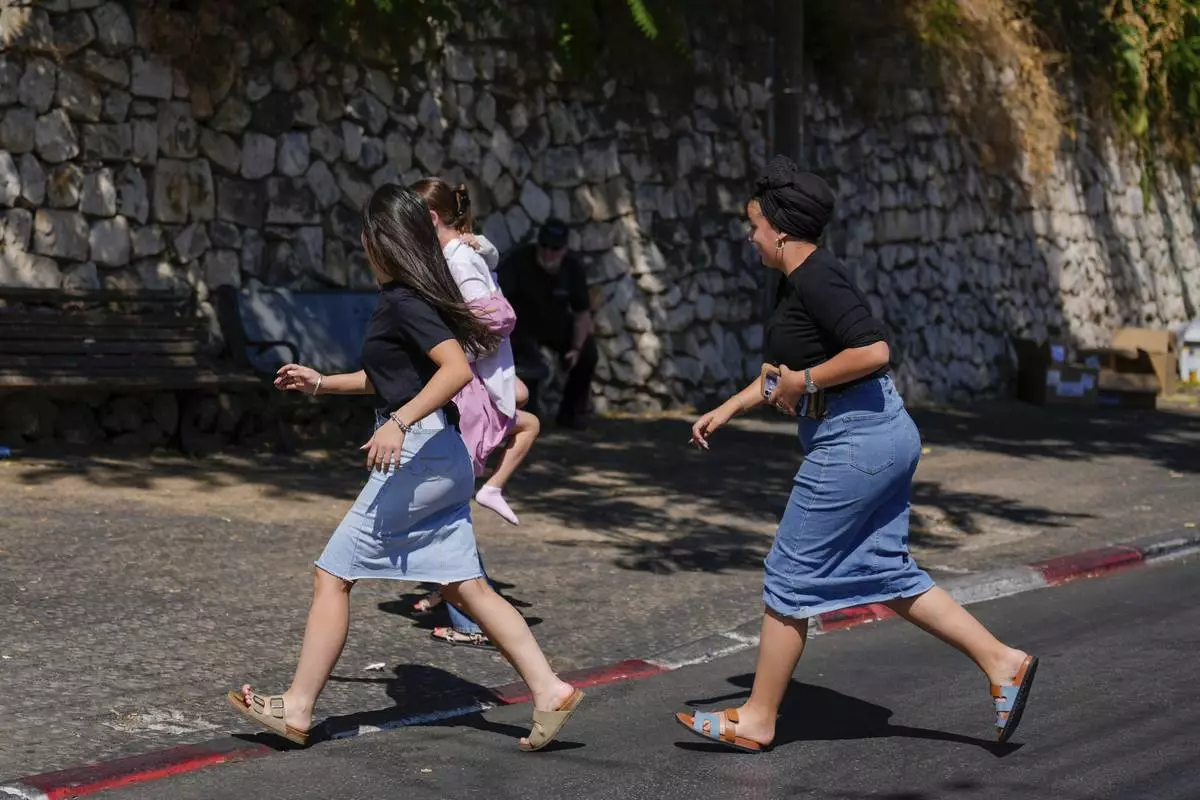
People run to take cover as a siren sounds a warning of incoming rockets fired from Lebanon, in Safed, northern Israel, Thursday, Sept. 26, 2024. (AP Photo/Ariel Schalit)
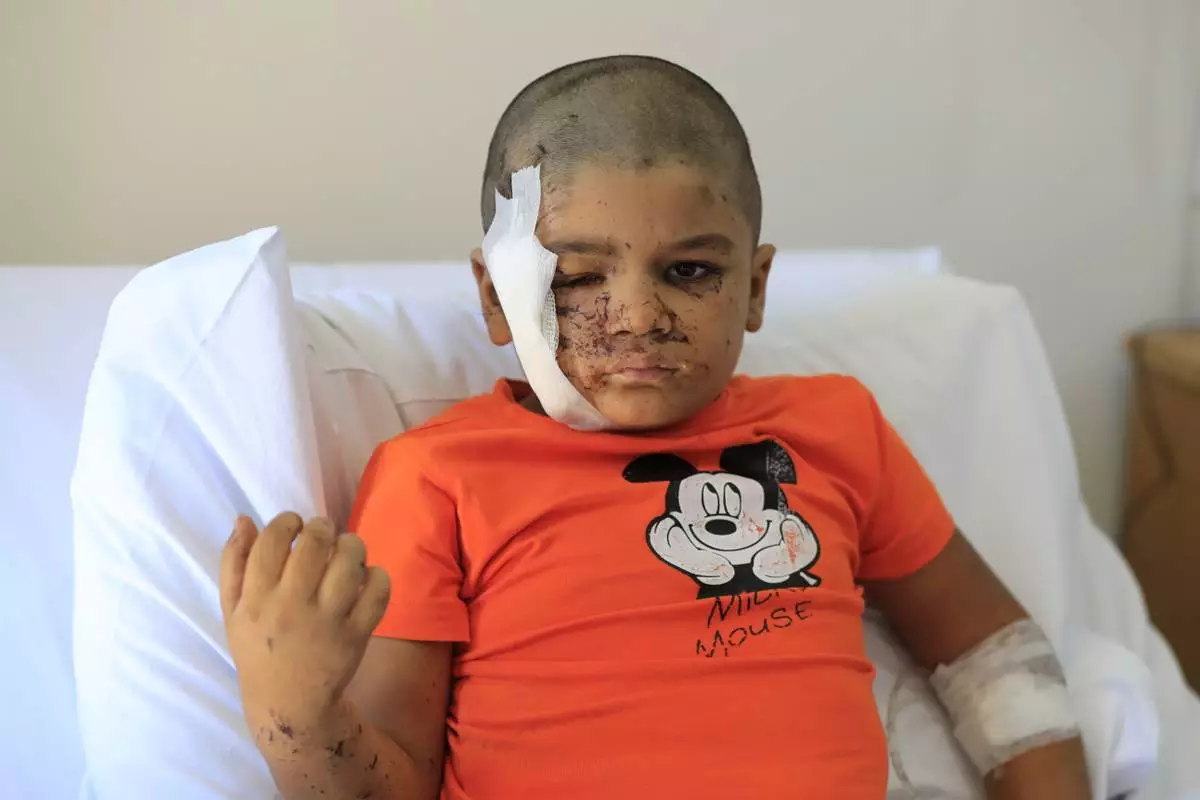
Ali Abdel Rahman Zorout, 5, who was wounded in an Israeli airstrike, poses for a picture at the Alaaeddine Hospital in Sarafand, south Lebanon, Thursday, Sept. 26, 2024. (AP Photo/Mohammed Zaatari)
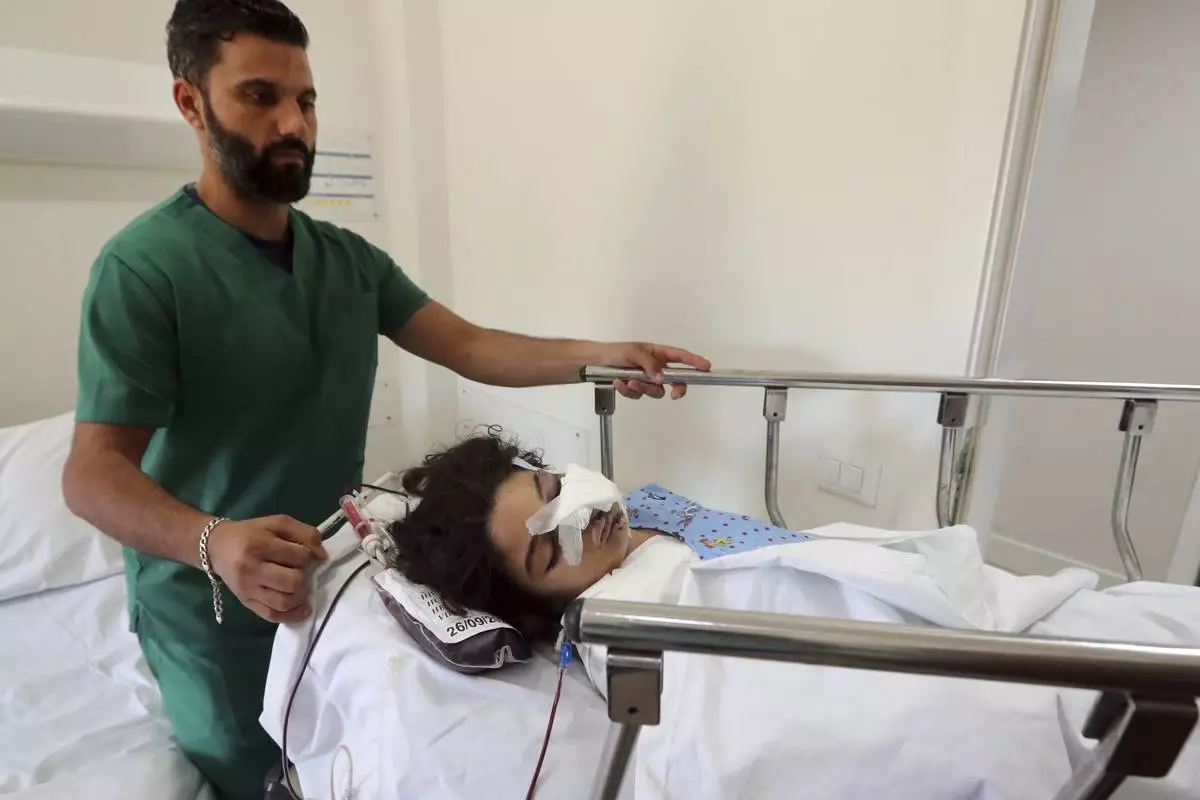
Fatima Abdel Rahman Zorout, 7, who was wounded in an Israeli airstrike, is wheeled on a gurney at the Alaaeddine Hospital in Sarafand, south Lebanon, Thursday, Sept. 26, 2024. (AP Photo/Mohammed Zaatari)
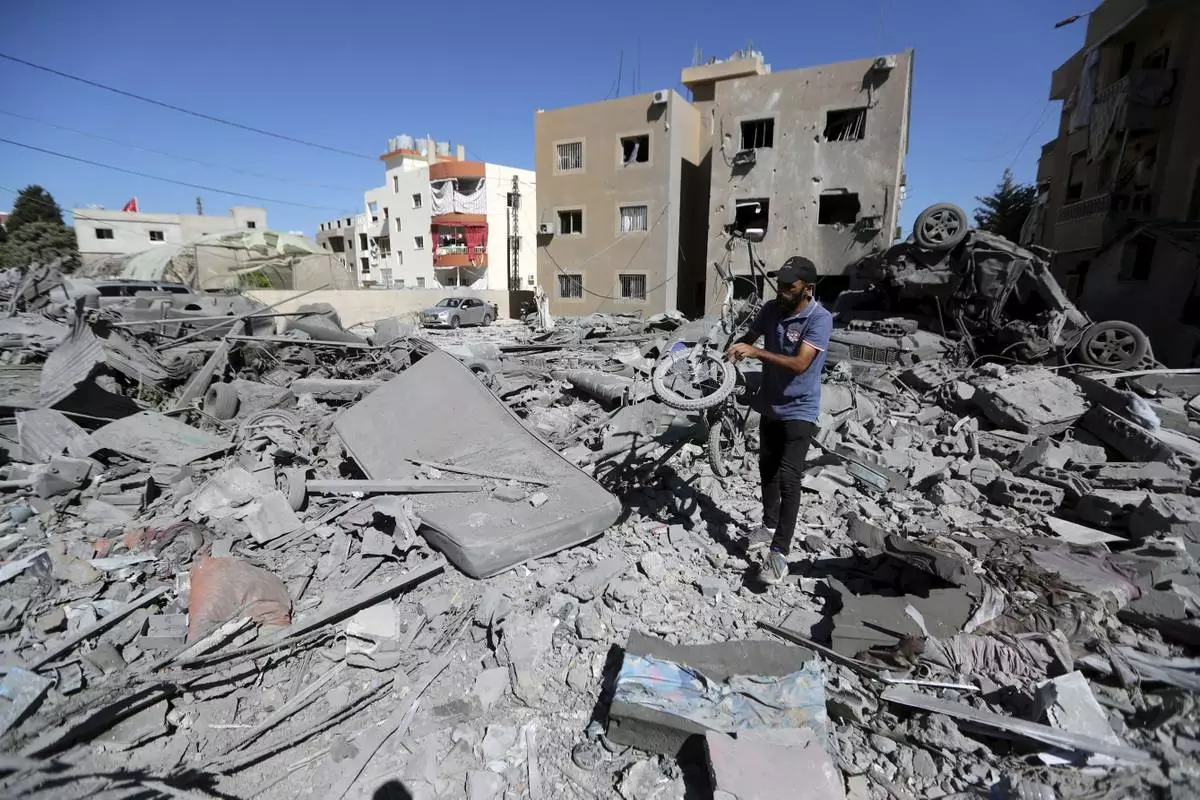
A man carries a damaged bicycle at the site of an Israeli airstrike in Saksakieh, south Lebanon, Thursday, Sept. 26, 2024. (AP Photo/Mohammed Zaatari)
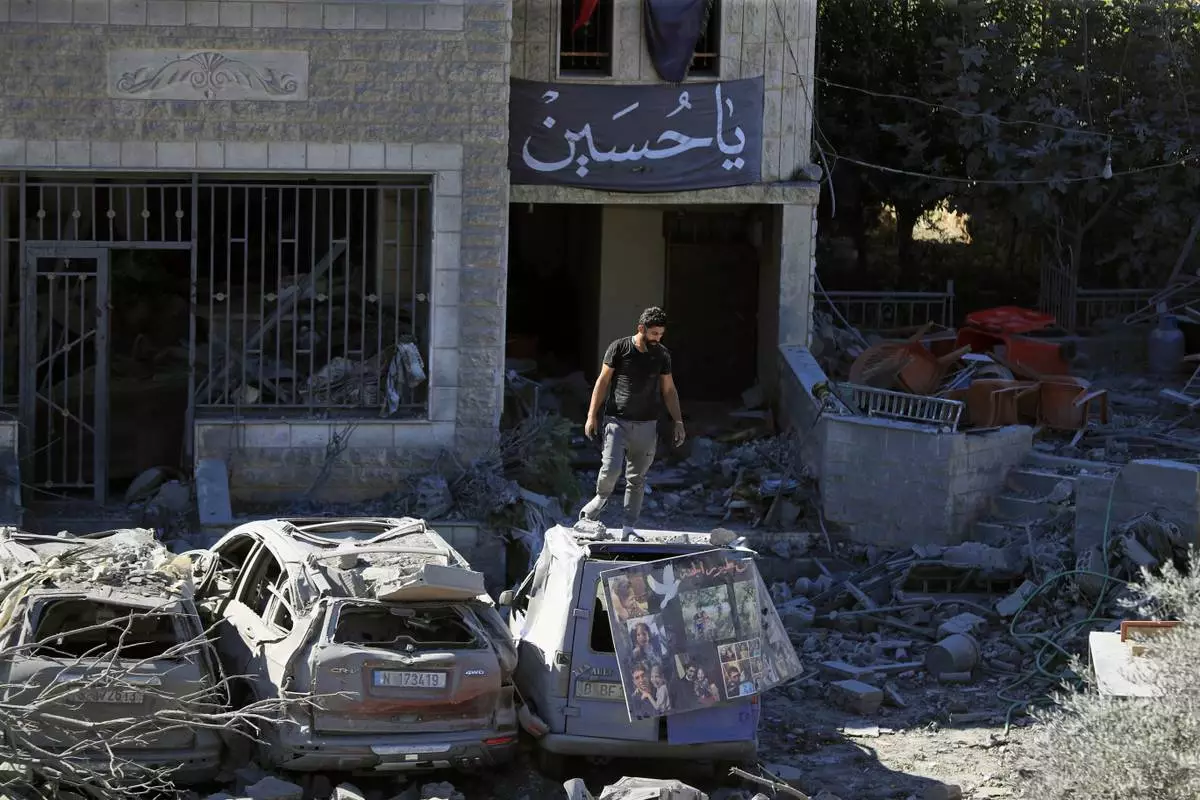
A man stands on top of a damaged car at the site of an Israeli airstrike in Saksakieh, south Lebanon, Thursday, Sept. 26, 2024. (AP Photo/Mohammed Zaatari)
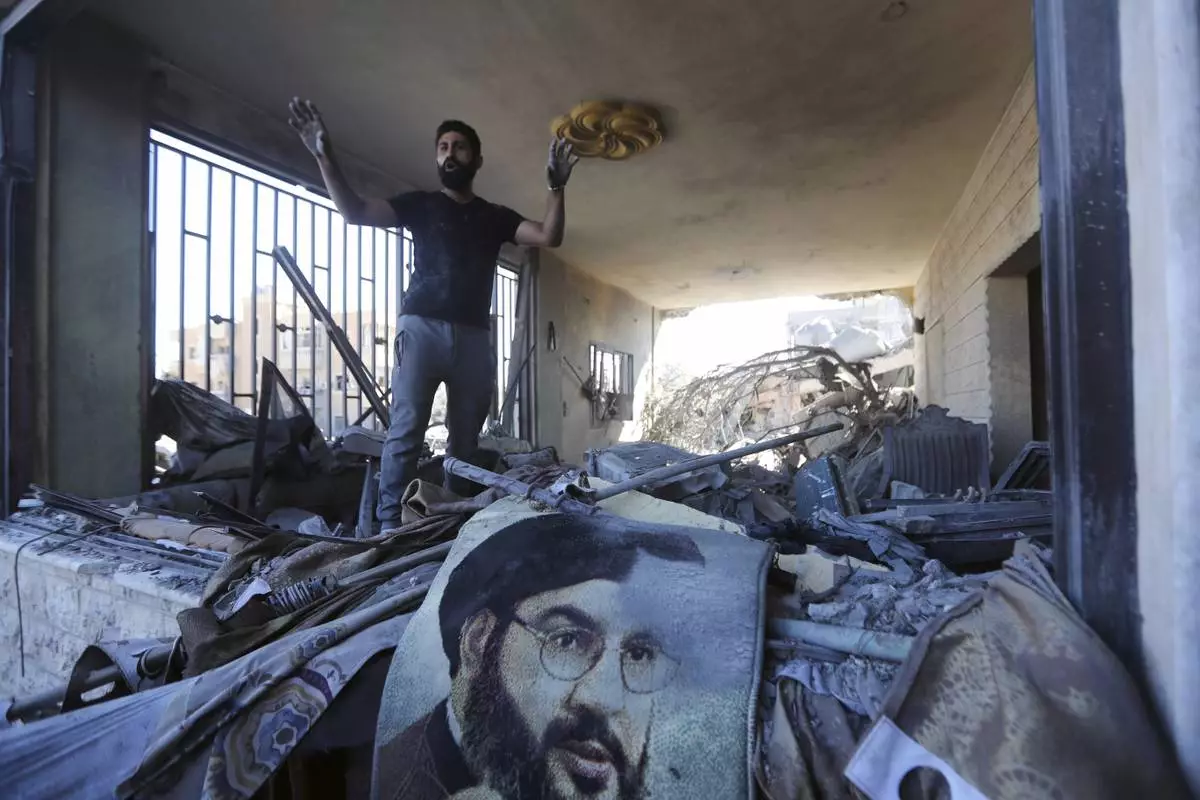
A man reacts in a damaged apartment at the site of an Israeli airstrike in Saksakieh, south Lebanon, Thursday, Sept. 26, 2024. (AP Photo/Mohammed Zaatari)
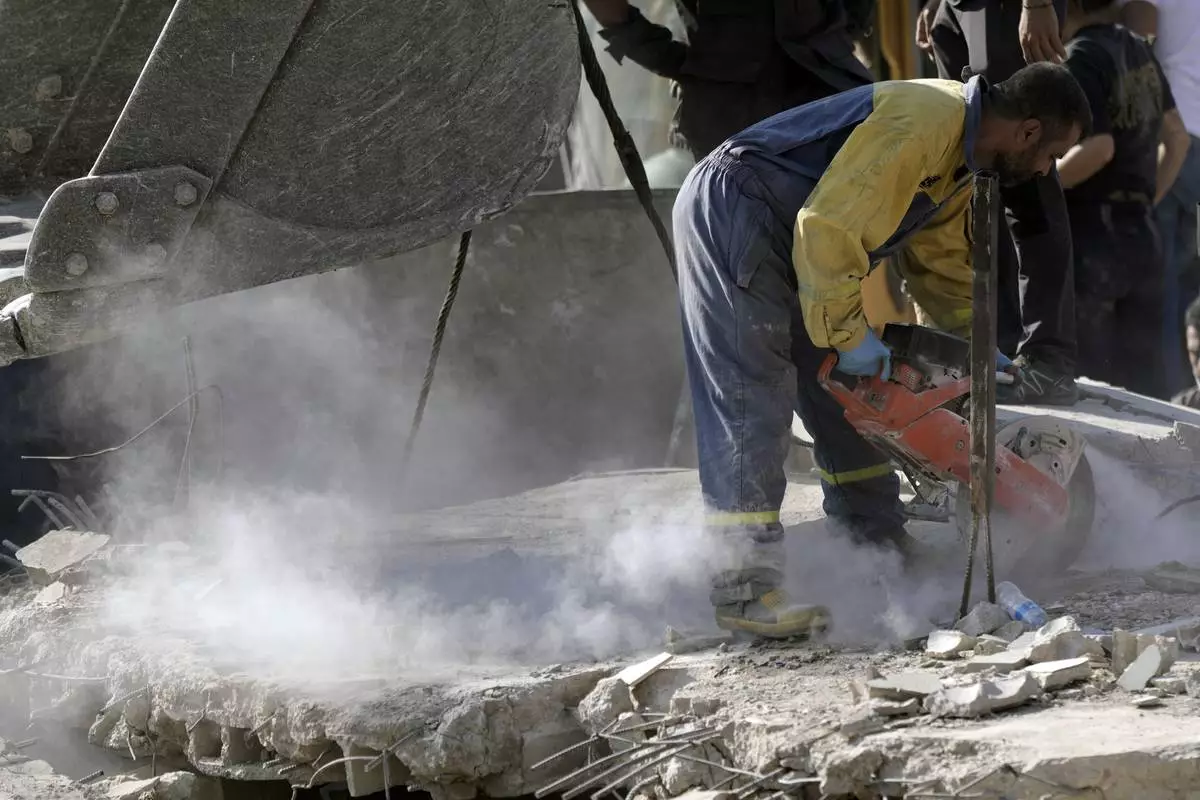
An emergency worker cuts concrete blocks as he searches for survivors at the scene of an Israeli airstrike in the town of Maisara, north of Beirut, Wednesday, Sept. 25, 2024. (AP Photo/Bilal Hussein)



























